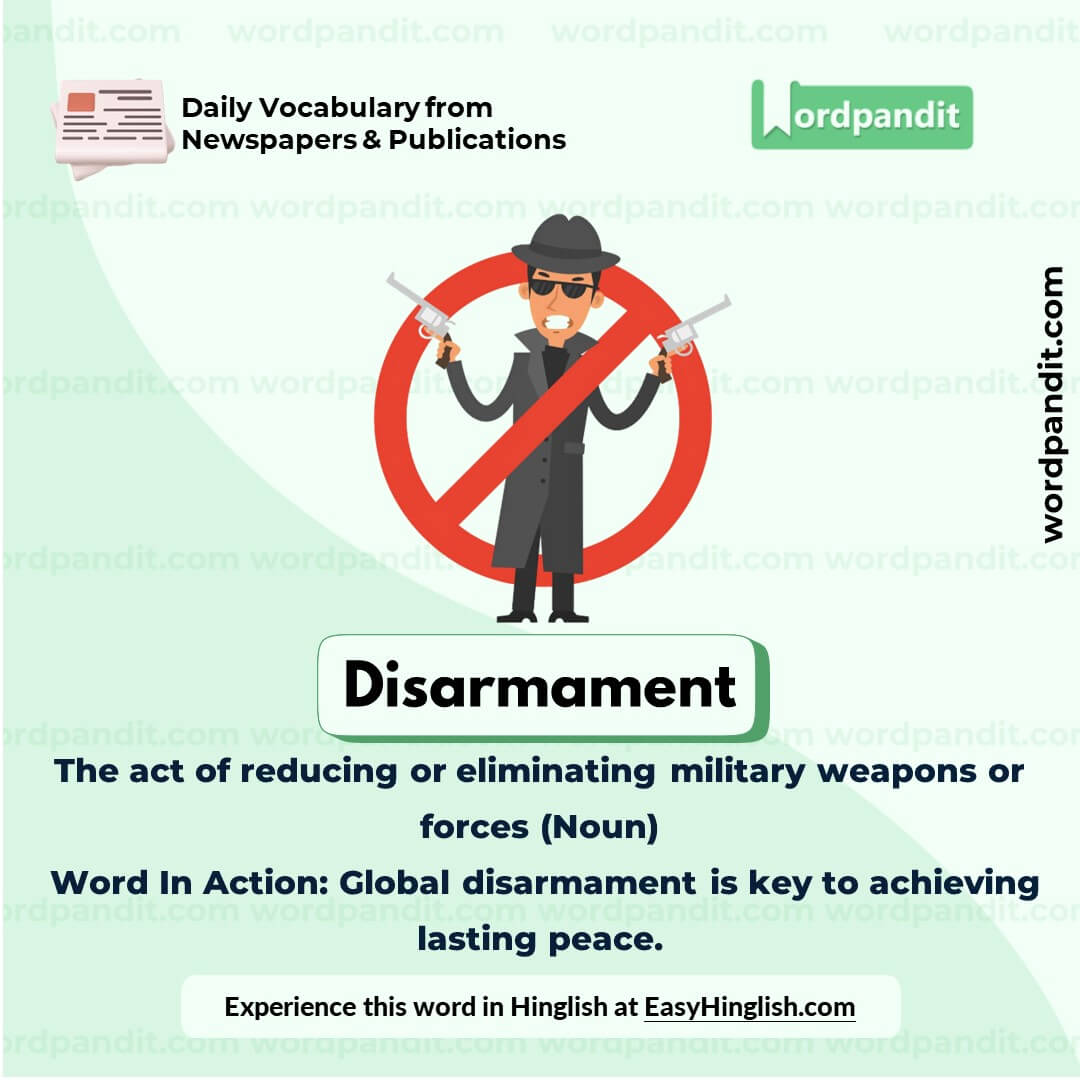Daily Vocabulary from Indian Newspapers and Publications
Welcome to Wordpandit’s Indian Vocabulary Hub
At Wordpandit, we understand the importance of staying rooted in the local context while expanding your language skills. This section focuses on enriching your vocabulary with words and phrases drawn from India’s leading newspapers and publications, ensuring you're learning vocabulary that is practical, relevant, and uniquely Indian.
Why Indian Sources Matter
We believe that the best way to master any language is by immersing yourself in local content. That’s why we carefully curate vocabulary from top Indian publications, including:
- The Hindu
- The Times of India
- The Economic Times
- Hindustan Times
- Live Mint
- The Indian Express
- And many others...
Stay Updated, Stay Relevant
With daily updates from Indian news sources, you’ll be consistently learning words that reflect the trends and shifts in Indian society and culture. Our focus is to provide vocabulary that enhances your understanding of the language in an Indian context.
How Wordpandit Supports Your Goals
Whether you’re preparing for exams, aiming to improve your professional communication, or simply want to stay connected with the latest Indian vocabulary, Wordpandit is here to guide you every step of the way.
Learn with a Practical Approach
Our interactive learning methodology includes real-world examples, engaging activities, and context-specific usage to ensure that every word becomes part of your active vocabulary.
Dive into Indian Vocabulary Today!
Why Choose Wordpandit?
Practical Learning: Focus on words you'll actually encounter in real-world reading, enhancing your comprehension and communication skills.
Diverse Content: From current affairs to scientific breakthroughs, our varied sources expose you to vocabulary across multiple domains.
Effortless Integration: Make Wordpandit a part of your daily routine. Just a few minutes each day can significantly boost your lexicon over time.
Your Path to Vocabulary Mastery
- Visit our Daily Vocabulary section regularly
- Explore new words and their usage in context
- Practice incorporating these words into your own writing and speech
- Track your progress as your vocabulary expands
Start Your Journey Today
Embark on your vocabulary enhancement journey with Wordpandit. By consistently engaging with our daily posts, you'll build a robust vocabulary that serves you well in academic, professional, and personal contexts.
Remember, a word a day keeps linguistic limitations at bay. Make Wordpandit your daily companion in the quest for vocabulary excellence!
WORD-1: Disarmament
Context:
"Former Chilean President Michelle Bachelet has been awarded the Indira Gandhi Prize for Peace, Disarmament and Development for 2024." - The Wire
Explanatory Paragraph:
Disarmament refers to the reduction or elimination of military forces and weapons by a nation, often as a step toward promoting peace and security. It can occur through treaties, agreements, or unilateral actions aimed at reducing the potential for conflict and fostering international cooperation.
Meaning: The act of reducing or eliminating military weapons or forces. (Noun)
Pronunciation: dih-SAR-muh-ment
Difficulty Level: ⭐⭐⭐ Intermediate
Etymology: Derived from the French word "désarmement," combining "dés-" (removal) and "armement" (arming or weapons), with roots in Latin "arma" (arms or weapons).
Synonyms & Antonyms:
Synonyms: Demilitarization, demobilization, de-escalation
Antonyms: Armament, militarization, rearmament
Usage Examples:
- The treaty focused on nuclear disarmament to prevent future conflicts.
- Disarmament talks between the two countries highlighted the need for mutual trust.
- Activists around the world campaign for global disarmament and peace.
- The disarmament of guerrilla groups helped restore order in the region.
Cultural Reference:
"The Nobel Peace Prize has been awarded several times to individuals and organizations for their efforts in advancing disarmament, such as the International Campaign to Abolish Nuclear Weapons (ICAN) in 2017." - NobelPrize.org
Think About It:
How can nations balance the need for security with the global push for disarmament?
Quick Activity:
List three examples of international treaties or agreements focused on disarmament. Research their impacts on global peace.
Memory Tip:
Think of "disarmament" as "removing arms" — literally taking away weapons to promote harmony.
Real-World Application:
Disarmament efforts are a cornerstone of international relations, influencing policies on nuclear weapons, chemical arms, and military spending. Understanding this concept is crucial for analyzing peace treaties and conflict resolution strategies.
WORD-2: Marginalised
Context:
"Her personal courage and example in standing for peace and the rights of marginalised people continue to inspire men and women around the world,” the Indira Gandhi Memorial Trust said." - The Wire
Explanatory Paragraph:
The term "marginalised" refers to individuals or groups that are pushed to the fringes of society and are often excluded from significant participation in social, economic, or political activities. They lack access to resources, opportunities, and representation, making their voices unheard in mainstream platforms.
Meaning: Treated as insignificant or peripheral (Adjective)
Pronunciation: mar-jin-uh-lized
Difficulty Level: ⭐⭐⭐ Intermediate
Etymology: Derived from the word "margin," meaning the edge or border, combined with the suffix "-ised," indicating being made to be on the margins. First used in the late 19th century.
Synonyms & Antonyms:
Synonyms: excluded, sidelined, ostracised, alienated
Antonyms: included, centralised, embraced, mainstreamed
Usage Examples:
- Efforts to empower marginalised communities have been gaining momentum in recent years.
- She advocates for policies that address the systemic issues faced by marginalised individuals.
- The documentary sheds light on the struggles of marginalised workers in urban areas.
- Inclusive education aims to bring marginalised students into the fold of mainstream learning.
Cultural Reference:
"The history of the world is a history of those who were marginalised finding ways to assert their existence and rights." - Paraphrased from a prominent social justice narrative.
Think About It:
What are some ways individuals and societies can help bring marginalised groups into mainstream opportunities?
Quick Activity:
List three marginalised groups in your country and write one action that can help improve their situation.
Memory Tip:
Think of "marginalised" as "on the margins" of society—excluded from the center of action or decision-making.
Real-World Application:
The term is widely used in discussions on social justice, policy-making, and activism to describe and address the challenges faced by disadvantaged groups.
WORD-3: Recurrence
Context:
"According to the Indian press release, the officials also 'reviewed the situation in border areas and reflected on the lessons learnt from the events of 2020 in order to prevent their recurrence.'" - The Wire
Explanatory Paragraph:
Recurrence refers to the act of something happening again, especially after an interval of time. It is often used in contexts involving undesirable events, such as conflicts, diseases, or mistakes, with a focus on efforts to prevent their repetition.
Meaning: The act of occurring or happening again, especially at intervals. (Noun)
Pronunciation: ree-KUR-uhns
Difficulty Level: ⭐⭐ Beginner
Etymology: Derived from the Latin word "recurrere," meaning "to run back," formed from "re-" (again) and "currere" (to run).
Synonyms & Antonyms:
Synonyms: Repetition, reappearance, return
Antonyms: Termination, cessation, conclusion
Usage Examples:
- The doctors implemented a new treatment plan to prevent the recurrence of the disease.
- The recurrence of floods in the region prompted the government to build better drainage systems.
- Regular maintenance is essential to avoid the recurrence of technical issues.
- The peace agreement was designed to prevent the recurrence of border disputes.
Cultural Reference:
"In healthcare, recurrence is a critical term often used in cancer treatment, where patients are monitored closely to detect and manage the return of the disease." - National Cancer Institute
Think About It:
Why is it important to analyze past events to prevent their recurrence, and how can we effectively apply lessons learned?
Quick Activity:
Identify an event in history where efforts were made to prevent its recurrence. Research the measures taken and their effectiveness.
Memory Tip:
Think of "recurrence" as "re-occur," which literally means to happen again, making it easy to remember the meaning.
Real-World Application:
Recurrence is a vital concept in fields like medicine, conflict resolution, and risk management. Understanding and preventing recurrence ensures long-term success in healthcare, governance, and organizational strategies.
WORD-4: Calibrated
Context:
"Now paves the way to explore other areas of bilateral engagement in a 'calibrated manner.'" - The Wire
Explanatory Paragraph:
Calibrated refers to something that is carefully measured, adjusted, or planned to achieve precision or balance. When used metaphorically, it signifies a deliberate and controlled approach to achieving a specific outcome or addressing a situation.
Meaning: Carefully adjusted or planned for a specific purpose. (Adjective)
Pronunciation: KAL-uh-bray-ted
Difficulty Level: ⭐⭐⭐ Intermediate
Etymology: From the word "calibrate," which originated from the French word "calibre" meaning "degree of accuracy" or "standard measure," and was later adapted into English.
Synonyms & Antonyms:
Synonyms: Measured, precise, controlled
Antonyms: Reckless, haphazard, unplanned
Usage Examples:
- The calibrated approach to reform ensured minimal disruption to the existing system.
- Scientists use calibrated instruments to ensure accurate readings during experiments.
- A calibrated response was necessary to address the diplomatic crisis effectively.
- The company took a calibrated risk by entering the new market cautiously.
Cultural Reference:
"In economics, a calibrated model is used to simulate the effects of policy changes, helping decision-makers anticipate outcomes with greater accuracy." - Harvard Business Review
Think About It:
Why is it important to take a calibrated approach when addressing sensitive issues, and how can over-precision sometimes backfire?
Quick Activity:
Think of a situation where you or someone else had to take a calibrated approach. Write down how careful planning impacted the outcome.
Memory Tip:
Link "calibrated" to "caliber," which suggests quality or precision, helping you associate it with careful adjustment or measurement.
Real-World Application:
In negotiations, a calibrated approach ensures that actions are deliberate and aligned with long-term goals. This term is also essential in fields like engineering, where precision and accuracy are critical for success.
WORD-5: Resumption
Context:
"Recent understanding arrived at after intensive negotiations, resumption of patrolling to the traditional areas is underway” in Demchok and Depsang, along with access to the local nomadic population to grazing grounds." - The Wire
Explanatory Paragraph:
Resumption refers to the act of starting something again after it has been paused or interrupted. It implies a continuation or renewal of activities, operations, or discussions that were temporarily halted.
Meaning: The act of beginning again or continuing after a pause. (Noun)
Pronunciation: ree-ZUMP-shun
Difficulty Level: ⭐⭐ Beginner
Etymology: Derived from the Latin word "resumptio," from "resumere," meaning "to take back" or "to begin again," formed from "re-" (again) and "sumere" (to take).
Synonyms & Antonyms:
Synonyms: Renewal, continuation, recommencement
Antonyms: Suspension, cessation, termination
Usage Examples:
- The resumption of flights after the storm brought relief to stranded passengers.
- The peace talks saw a resumption after months of deadlock.
- Resumption of trade between the two countries has boosted their economies.
- After the intermission, the resumption of the play was met with great enthusiasm by the audience.
Cultural Reference:
"The resumption of diplomatic ties between the United States and Cuba in 2015 marked a significant turning point in international relations." - BBC News
Think About It:
Why do you think resumption often requires negotiation or mutual understanding, especially in international or political contexts?
Quick Activity:
Think of a time when you had to resume an important task after a break. Write a brief paragraph about what made the resumption successful or challenging.
Memory Tip:
Link "resumption" with "resume," which means to continue after a pause, making the meaning clear and easy to remember.
Real-World Application:
Resumption is a critical concept in diplomacy, business, and everyday life. Whether restarting talks, operations, or routines, understanding how to manage a smooth resumption is key to continuity and success.
















